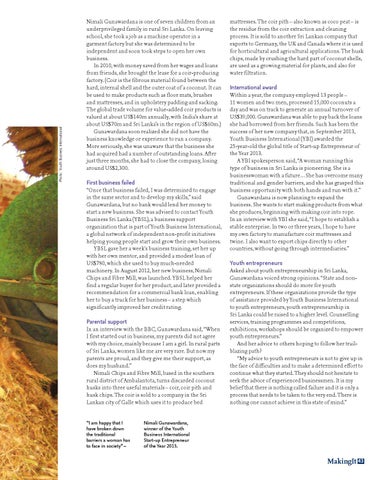Photo: Youth Business International
makingit_16_pp42-43_good-business_print 22/07/2014 11:19 Page 43
Nimali Gunawardana is one of seven children from an underprivileged family in rural Sri Lanka. On leaving school, she took a job as a machine operator in a garment factory but she was determined to be independent and soon took steps to open her own business. In 2010, with money saved from her wages and loans from friends, she brought the lease for a coir-producing factory. (Coir is the fibrous material found between the hard, internal shell and the outer coat of a coconut. It can be used to make products such as floor mats, brushes and mattresses, and in upholstery padding and sacking. The global trade volume for value-added coir products is valued at about US$140m annually, with India’s share at about US$70m and Sri Lanka’s in the region of US$60m.) Gunawardana soon realized she did not have the business knowledge or experience to run a company. More seriously, she was unaware that the business she had acquired had a number of outstanding loans. After just three months, she had to close the company, losing around US$2,300.
First business failed
“Once that business failed, I was determined to engage in the same sector and to develop my skills,” said Gunawardana, but no bank would lend her money to start a new business. She was advised to contact Youth Business Sri Lanka (YBSL), a business support organization that is part of Youth Business International, a global network of independent non-profit initiatives helping young people start and grow their own business. YBSL gave her a week's business training, set her up with her own mentor, and provided a modest loan of US$780, which she used to buy much-needed machinery. In August 2012, her new business, Nimali Chips and Fibre Mill, was launched. YBSL helped her find a regular buyer for her product, and later provided a recommendation for a commercial bank loan, enabling her to buy a truck for her business – a step which significantly improved her credit rating.
Parental support
In an interview with the BBC, Gunawardana said, “When I first started out in business, my parents did not agree with my choice, mainly because I am a girl. In rural parts of Sri Lanka, women like me are very rare. But now my parents are proud, and they give me their support, as does my husband.” Nimali Chips and Fibre Mill, based in the southern rural district of Ambalantota, turns discarded coconut husks into three useful materials – coir, coir pith and husk chips. The coir is sold to a company in the Sri Lankan city of Galle which uses it to produce bed “I am happy that I have broken down the traditional barriers a woman has to face in society” –
mattresses. The coir pith – also known as coco peat – is the residue from the coir extraction and cleaning process. It is sold to another Sri Lankan company that exports to Germany, the UK and Canada where it is used for horticultural and agricultural applications. The husk chips, made by crushing the hard part of coconut shells, are used as a growing material for plants, and also for water filtration.
International award
Within a year, the company employed 13 people – 11 women and two men, processed 15,000 coconuts a day and was on track to generate an annual turnover of US$39,000. Gunawardana was able to pay back the loans she had borrowed from her friends. Such has been the success of her new company that, in September 2013, Youth Business International (YBI) awarded the 25-year-old the global title of Start-up Entrepreneur of the Year 2013. A YBI spokesperson said, “A woman running this type of business in Sri Lanka is pioneering. She is a businesswoman with a future…She has overcome many traditional and gender barriers, and she has grasped this business opportunity with both hands and run with it.” Gunawardana is now planning to expand the business. She wants to start making products from what she produces, beginning with making coir into rope. In an interview with YBI she said, “I hope to establish a stable enterprise. In two or three years, I hope to have my own factory to manufacture coir mattresses and twine. I also want to export chips directly to other countries, without going through intermediaries.”
Youth entrepreneurs
Asked about youth entrepreneurship in Sri Lanka, Gunawardana voiced strong opinions. “State and nonstate organizations should do more for youth entrepreneurs. If these organizations provide the type of assistance provided by Youth Business International to youth entrepreneurs, youth entrepreneurship in Sri Lanka could be raised to a higher level. Counselling services, training programmes and competitions, exhibitions, workshops should be organized to empower youth entrepreneurs.” And her advice to others hoping to follow her trailblazing path? “My advice to youth entrepreneurs is not to give up in the face of difficulties and to make a determined effort to continue what they started. They should not hesitate to seek the advice of experienced businessmen. It is my belief that there is nothing called failure and it is only a process that needs to be taken to the very end. There is nothing one cannot achieve in this state of mind.”
Nimali Gunawardana, winner of the Youth Business International Start-up Entrepreneur of the Year 2013.
MakingIt 43
